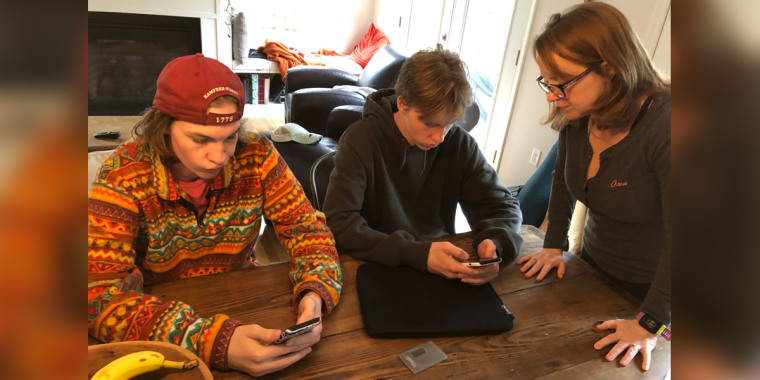The statistics surrounding kids and social media are astounding.
Only half the parents of kids aged 5 to 15 use some type of parental controls. One in three children are cyberbullied online. Fifty-seven percent of all teens agree that using social media often distracts them when they should be doing homework. And the horror stories that get shared at Mom’s Nights Out are just flat-out terrifying.
While we can draw upon our own experiences for evergreen parenting issues like curfews, homework and sex education, there’s no blueprint for teens and social media. This is uncharted parental territory. Our kids are digital natives and, in many cases, the natives are running wild.
As much as we think we are aware and on top of things, most parents are at least a half digital step behind their children. This includes me. In my household, we require all phones belonging to our 17-year-old twins and 12-year-old son to be plugged in at the kitchen charging station at 9 p.m. Over early morning coffee each day, my husband and I review the previous day’s search history, texts (including the mysterious missing conversation threads), and camera history. My husband went so far as to put the older boys’ Instagram accounts on his phone to monitor notifications.
But it wasn’t until my 12-year-old revealed he was sending inappropriate content to one of his brother’s girlfriend via Tik Tok's direct messaging that I knew we had a problem. Because no matter how much we tried to control it, we were always a step behind.
I have since shifted my approach. Rather than regulating the world of social media, I realized that I needed to teach my sons how to navigate this new world order. Even if your child doesn’t own a device or have a social media account, he or she is probably looking over someone’s shoulder at a YouTube video on the bus ride home or glancing at a meme on a group chat being passed around the cafeteria.
RELATED: Has social media become a socially acceptable addiction?
I recently turned to a few experts to give me their perspectives on how to navigate the fast-changing social media world our children are living in.
Know the basics.
Make sure you have your child’s device password, social media account logins and passwords. This also includes their iTunes account info. If the iTunes account is in your name, you will see when any content or apps are downloaded. Fair warning: If you delete one of your child’s apps, it will re-download when the device is synced to a computer unless you enact specific parental controls preventing it. This is how Snapchat has made three rounds of appearances on my teenagers’ phones despite my banning it.
Set some ground rules.
Figure out what works for your family, and be prepared to reevaluate. In our house, for example, all apps require parental approval and all devices must be used in a public environment. That means no cell phones, iPads or laptops in bedrooms. But how do you know what’s right for your family?
Leverage freely available resources like Common Sense Media, but also ask other parents what they’re doing. And no judgment! This isn’t a soapbox moment or an excuse to defend your parenting actions, just ask with curiosity and ask what has worked, and what hasn’t. And it’s very helpful to ask parents with kids just a little bit older than yours how they handle certain technologies, what their family rules are, and what consequences motivate kids to follow family policy. On a recent walk, a friend with a 3rd grader asked a mom of older kids when it was the right time to get a device. “Only after they’ve established a love of reading, otherwise, you’ll be competing against devices and books lose every time,” she said. Solid advice.
Model good behavior.
Suzie Taylor, parent liaison at Carl Sandburg Middle School in Alexandria, Virginia, urges parents to ask their kids what they see them doing on social media. It’s pretty compelling when your daughter says, “I see you on Facebook for hours after dinner every night,” or your teenager – who is learning to drive – says “You don’t think I see you sneaking a peek at your texts while driving, but I do.” When a child is speaking to you, put down your phone and give them your full attention. Don’t overshare on social media and have some times and dates that are free from digital intervention.
RELATED: Social media is only 'Half the Story': How to share life unfiltered
Check in, don’t snoop.
Katie Greer, former director of internet safety in the Massachusetts Attorney General’s Office and expert on kids and technology, advised to lay off the snooping in favor of more frequent check-ins. “In most cases, you pay for the phones and the access, there should be no expectation of privacy. But rather than lurking on phones after kids go to bed, start conversations about what’s happening online. Follow along. Ask what’s new.” Greer believes that by engaging in conversations rather than constantly playing catchup on rules and consequences, parents can help guide their children in a fast-changing digital world.
The bottom line is technology is moving faster than we can regulate. Rather than trying to control every aspect of technology, we must teach our children how to navigate their own digital lives. And they might just teach us a thing or two in the process.
Jennifer Folsom is vice president of client delivery at Washington, D.C.-based management consulting firm RIVA Solutions Inc. She lives in Alexandria, Virginia, with her husband Ben and three sons, 17-year-old twins Josh and Will, and 12-year-old Anderson. Her practical guide to modern working motherhood," The Ringmaster," is out now.
